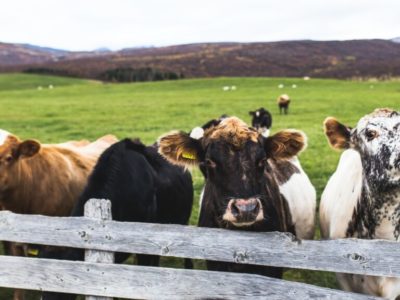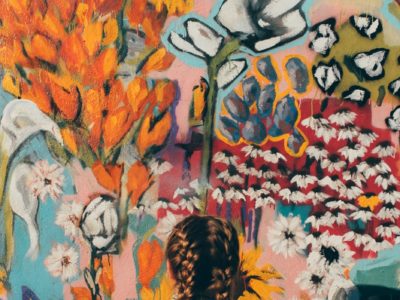The animal sciences major, though often written off as little more than a way to get into vet school, is actually a way to explore your biggest passion–your love for animals, big or small. With diverse courses (hello, aquarium class!) and tons of opportunities for hands on research or training, this major is perfect for anyone who wants to put down the books and get their hands on some cute animals.
While most students suffer through a particularly dull accounting lecture, you get to help birth horses.
What You’ll Be Doing
Animal science majors aren’t afraid to get down and dirty. Whether it’s investigating fecal matter or palpating pregnant heifers, you’ll do a lot of hands on work in this field. “I don’t know many people who can say that they have participated in the slaughtering and fabrication process of the foods they eat,” animal science major Mackenzie Barickman said. “I was able to be hands on with the slaughter of a hog, lamb and cow.” Many schools offer courses that allow for this “learn by doing” approach during undergrad, something that their liberal arts peers rarely get to experience over the course of their studies.
The classes you’ll take
“I’m not just learning about animals,” said Barickman. “I am learning about wildlife, forages, biology, communication, business, reproduction, as well as live animals and the meat we consume from them.” Check out Practicum in Horse Management and Training, for example. This two credit course lets you literally take a life into your own hands–the life of a baby foal, that is. There’s also Reproductive Physiology and Endocrinology of Domestic Animals, which sounds like a mouthful, and has the coursework to go along with it. This course covers the reproductive anatomy, physiology and endocrinology of cows, pigs, horses, sheep and even common household pets like cats, dogs and birds. “I enjoyed this class because I found I had an aptitude for the information and it had a medical component to it,” said Cara Vogel, Class of 2016.
If you’re unsure of selecting animal sciences as your major, take an intro class to see how you like it. “Intro to Animal Science was super beneficial to my understanding as a whole,” said Barickman. “We studied chickens. Our advisor literally raised chicks strictly for our class.” For those more interested in livestock, there’s always dairy management to learn how the dairy industry works on and off the farm. “I was out to the dairy farm nearly every day that semester between class, lab and work,” North Carolina State Alum Mary Za said. “The best part was that my professor’s test bonuses were always cow jokes!”
Internships for this major
For those interested in veterinary sciences, you can attend the FDA Vet Med Student Program, where you can travel to Maryland to learn about the role vets play in safeguarding the health of human and animals. “I did everything [at the NCSU Dairy Research and Teaching Facility] from newborn care, feeding, milking and even giving vaccines when needed,” Za said. “It paid off tremendously, as I now work at the facility as an animal health care technician.” Those with a concentration in livestock can gain experience in the field by working with the meat industry. “My senior year, I interned for Cargill Meat Solutions as their operations intern,” Texas A&M alumni Michelle Mendoza said. “This internship really showed me all the different aspects of the meat industry. I also worked with accounting, quality assurance, human resources and maintenance.” The most coveted internship, however, has to be the highly competitive Animals, Science and Environment internship with Disney, where you can spend a semester working with guests and animals at Animal Kingdom, Tri-Circle D Ranch and The Seas with Nemo & Friends Pavilion at Epcot. Sounds like a magical semester to me.
Career Opportunities
Believe it or not, if you major in animal sciences you can do more than go to vet school. “Animal science is so much more than ‘future veterinarian,'” said Barickman. “It’s future extension agent, dairy farm manager, animal nutritionist, meat scientist, food inspector and so much more.” From sales and marketing to breeding and pharmaceuticals, Animal Science majors are encouraged not to stick to just one thing.
1. Vet
It seems like every young child wanted to be at vet at some point. After all, who wouldn’t want to spend their days surrounded by adorable animals? But students wanting to pursue veterinary sciences should make sure to be dedicated. To be a vet, students are expected to have up to nine years of schooling. “I started getting involved my freshman year of college,” Za said. “I would advise students to start small. You don’t have to take on all these obstacles all at once.” All this training prepares vets for a variety of duties, including examining animals (large or small), diagnosing medical conditions and even performing surgery. What most people don’t realize is that it’s not just for your typical household pets. You could be working with exotic animals, like lions and tigers or specialize in livestock. Employment opportunities range from zoos to small practices to even the armed forces.
2. Lab Researcher
Ever seen the movie “Contagion”? Lab Researchers can use their animal sciences degree to be the next disease hunters, tracking emerging diseases and their zoonotic origins. Whether it’s determining the effectiveness of a new pharmaceutical or studying a new disease, lab researchers never have a dull day at work. With an animal sciences major, professionals can gain the hands on experience needed to spend a life time of research on projects that shape the way we see the world.
3. Food Production
Did you know that wild animal trade is worth twice as much as the drug industry? That means that you could be making more money working with cattle than being the next Narcos (and I wouldn’t recommend that). Working in food production is a no-brainer for many animal sciences majors. Some go to the dairy industry, where they spend their time managing dairy farms and developing new ways to make the $27-billion-dollar industry more effective. Others work in the beef industry or with livestock and cattle. Consider double majoring in economics or agribusiness to see how the animal sciences intersect with public policy and politics, on both a small and large scale.
4. Breeding Management
Have you ever seen the Kentucky Derby or went to see the Lippizaners? Have you ever wondered how these horses got to be champions? Breeding Management professionals are in charge of all that. “I invest a lot of effort into researching and matching a mare to a stallion,” breeding management professional Nick Carden said. This is a fulfilling career for anyone who shares a passion for any species, equine or not.
5. Animal Nutritionist
When we troll the aisles at PetSmart, we don’t really put a lot of thought into what we’re picking up for our furry little friends. That’s the job of an animal nutritionist. Animal nutritionists may focus on pets (or companion animals, for those who know the lingo), livestock or even zoo animals and research and create diets for all types of animals. Animal nutritionists have the ability to work in big cooperations, universities or zoos across the world. For those struck with eternal wanderlust, this may be the job for you.
Reviews
“I have gained so much understanding of the Ag[riculture] industry as a whole. I’ve gained knowledge of how our foods are produced (which seems to be a hot topic lately), which allows me to have an educated conversation. I think the most useful thing I’ve learned, and will use most often, is how agriculture is what allows this world to function. I’ve learned about plants and animals as individuals, but also as an ecosystem.”–Mackenzie Barickman, University of Florida, Class of 2016
“As an animal sciences major with a meat science certificate, I feel that I have a vast knowledge of the meat industry most consumers do not have. I am constantly educating friends and family over nutritious and delicious choices, as well as debunking common myths over the agriculture industry.”–Michelle Mendoza, Texas A&M, Class of 2013
“I have gained experience with animals that I would not have had the opportunity to work with otherwise. It has sufficiently prepared me for veterinary school or a job in the equine or food animal industries.”–Cara Vogel, University of Florida, Class of 2016



















